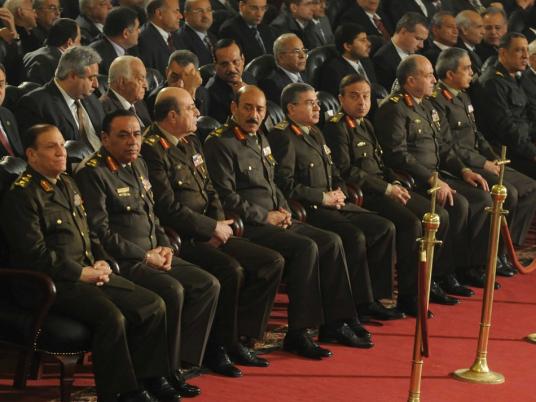
Muslim Brotherhood officials have revealed that the group has almost come to an understanding with the ruling military council over President-elect Mohamed Morsy’s powers and responsibilities once he enters office. Morsy is scheduled to swear in before the Supreme Constitutional Court on Saturday as Egypt’s new president.
Days before the announcement of Morsy’s win, the Supreme Council of the Armed Forces had issued a supplement to the Constitutional Declaration that has governed Egypt since March 2011. The supplement triggered a political outcry, and was accused of giving the military council independence from the president while diminishing the latter’s powers.
Essam Haddad, one of Morsy’s aids, said negotiations are being made with the Supreme Council of the Armed Forces over several issues so as to facilitate their work together in the future. Haddad, who accompanied Morsy in his first visit to the presidential palace on Monday, said these negotiations include potential amendments to the supplement to the Constitutional Declaration.
Haddad said that as part of the deal, the army will maintain control over its own budget and internal affairs. He added that the SCAF, however, will not interfere with the Constituent Assembly that is tasked with drafting the country’s new constitution.
A senior Muslim Brotherhood official, who asked not to be named, said the SCAF had agreed to cede their right to veto the formation of the Constituent Assembly, provided that ten Islamist assembly members are replaced with SCAF-approved individuals.
The same source added that Morsy’s team and the SCAF also agreed on how political parties will be distributed throughout different ministries in the new government. The source said that while the Muslim Brotherhood will be eligible to serve in the ministries of finance and foreign affairs, they would not be nominated to the defense, interior or justice ministries.
Sobhi Saleh, a senior leader of the Brotherhood’s Freedom and Justice Party, also admitted to negotiations with the SCAF. “In terms of solutions to the problem of the dissolution of Parliament, we discussed enforcing the Supreme Constitutional Court’s ruling by holding new elections for the individual seats only,” he said.
Edited translation from Al-Masry Al-Youm




